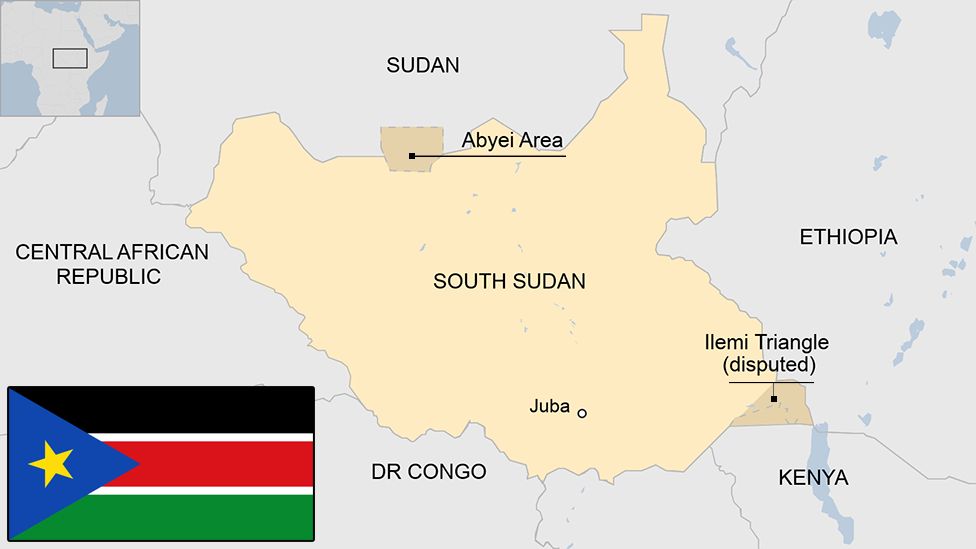South Sudan country profile
-
Published

South Sudan gained independence from Sudan on 9 July 2011 as the outcome of a 2005 agreement that ended Africa's longest-running civil war.
Made up of the 10 southern-most states of Sudan, South Sudan is one of the most diverse countries in Africa. It is home to over 60 different major ethnic groups.
Independence did not bring conflict in South Sudan to an end. Civil war broke out in 2013 when the president fell out with his then vice president, leading to a conflict that has displaced some four million people.
A power-sharing agreement was signed between the warring parties in August 2018 in a bid to bring the five-year civil war to an end.
- Read more country profiles - Profiles by BBC Monitoring
REPUBLIC OF SOUTH SUDAN: FACTS
- Capital: Juba
- Area: 644,329 sq km
- Population: 11.5 million
- Languages: English, also Dinka, Nuer, Murle, Luo, Ma'di, Otuho, Zande and others
- Life expectancy: 54 years (men) 57 years (women)
LEADER
President: Salva Kiir Mayardit
Salva Kiir Mayardit became president of South Sudan - then still part of Sudan - and head of the Sudan People's Liberation Movement (SPLM) in 2005, succeeding long-time rebel leader John Garang, who died in a helicopter crash.
Mr Kiir was re-elected as president in multiparty polls in the south in April 2010. In July 2011, when South Sudan became independent, he became president of the new state.
Just two years later, however, the country was engulfed by civil war when Mr Kiir sacked his entire cabinet and accused Vice-President Riek Machar of instigating a failed coup.
In August 2018, after five years of civil war, Mr Kiir signed a power-sharing agreement with rebel leader Machar and other opposition groups in a bid to end the brutal conflict.
MEDIA
Constitutional guarantees of media freedom are not respected in practice, and journalists risk harassment and detention over reports deemed unfavourable by the authorities.
Radio is the most popular medium. Private local stations, some of them with foreign funding, broadcast alongside the state-run national network.
TIMELINE
Some key dates in South Sudan's history:
1952 - Egyptian revolution triggers a move towards Sudanese independence. Egypt and Britain allow both Sudanese regions, north and south, to vote on independence.
1956 - Sudan becomes independent but southern states are unhappy with their lack of autonomy.
1955-1972 - First Sudanese Civil War, between north and south over demands for more regional autonomy by southern Sudan region. Some 500,000 are estimated to have been killed.
1972 - Peace agreement signed, but this fails to satisfactorily dispel tensions.
1969 - Colonel Gaafar Nimeiry carries out a coup. Parliament and political parties are abolished.
1983 - Numeiry introduces Sharia Islamic law.
1983-2005 - Second Sudanese Civil War. Between the central Sudanese government and the Sudan People's Liberation Army. Largely a continuation of the first civil war.
2011 - South Sudan becomes an independent country, after over 20 years of guerrilla warfare. Some two million people are estimated to have died as a result of war, famine and disease caused by the conflict, and more than four million displaced.
2012 - Disagreements with Sudan over the oil-rich region of Abyei erupt into fighting, known as the Heglig Crisis. A peace deal is reached, creating a 10km demilitarized zone along the border and allowing South Sudan's oil exports to restart.
2013 - Civil war breaks out after the president, Salva Kiir, sacks the cabinet and accuses Vice-President Riek Machar of planning a failed coup. Over 2.2 million people are displaced by the fighting and severe famine puts the lives of thousands at risk.
2018 - Renewed bid to end civil war leads to a power-sharing agreement between the warring sides.
Related Topics
-
-
Published13 September 2023
-
-
-
Published2 January
-
-
-
Published4 July 2023
-
-
-
Published26 April 2023
-
-
-
Published2 January
-
-
-
Published22 August 2023
-